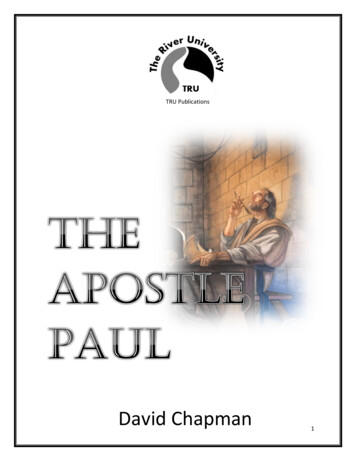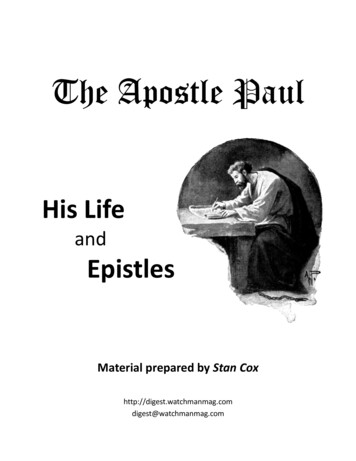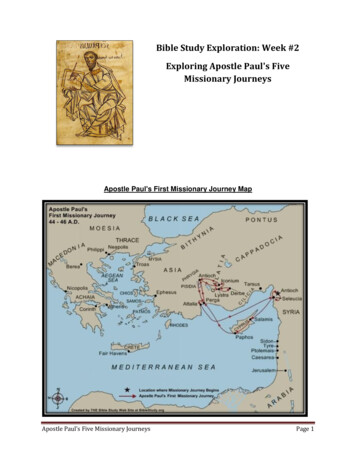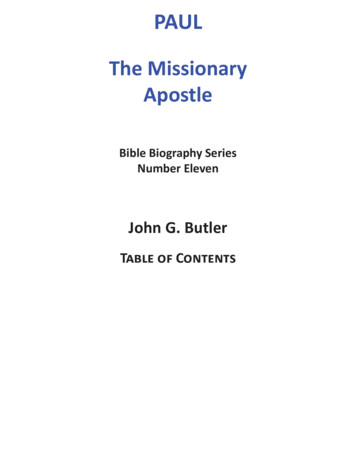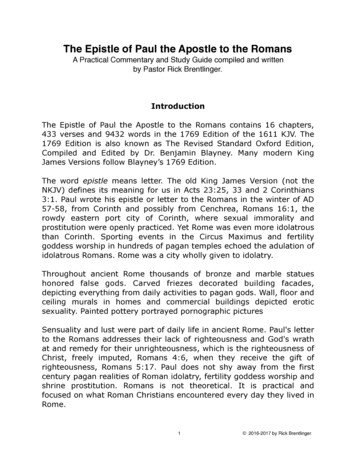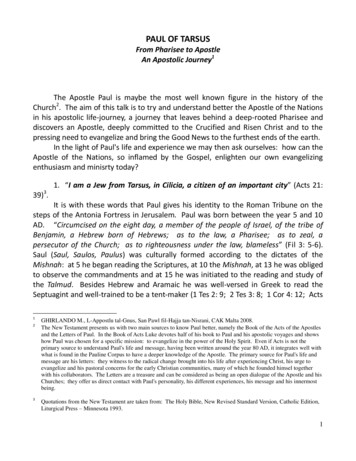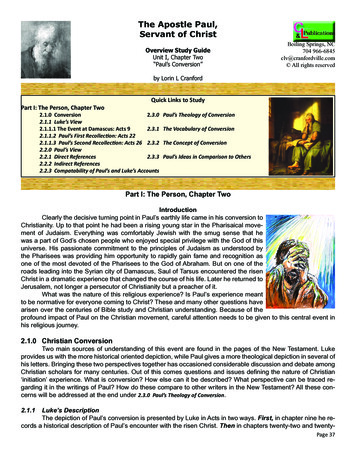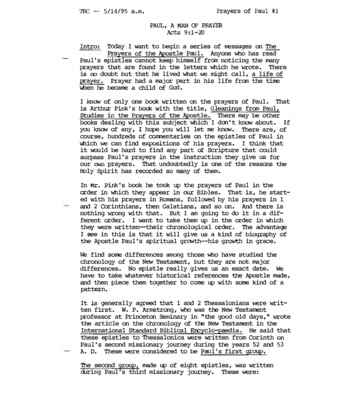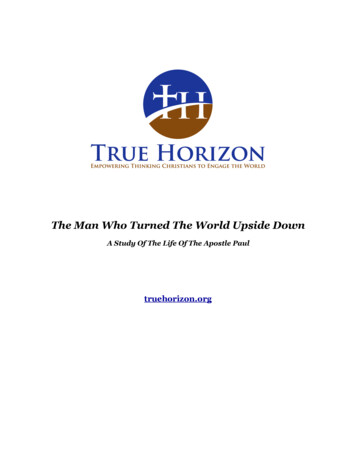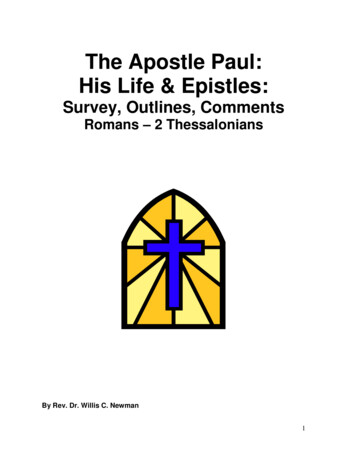
Transcription
The Apostle Paul:His Life & Epistles:Survey, Outlines, CommentsRomans – 2 ThessaloniansBy Rev. Dr. Willis C. Newman1
The Apostle Paul:His life & EpistlesSurvey, Outlines, Comments:Romans – 2 ThessaloniansBy Rev. Dr. Willis C. Newman(B.A., M.Ed., M.Div., Ph.D., D.Min.)First published: 1993, Polynesian MissionsFormerly entitled: A Bible Commentary for PolynesiaRevised and expanded: 2013, Newman Ministries International, demy.orgScripture taken from the New American Standard Bible, 1960, 1962, 1963, 1968, 1971, 1972, 1973, 1975, 1977By the Lockman Foundation. Used by permission.2
INTRODUCTIONThis commentary on the Pauline Epistles is a drawing together of years of researchand writing on biblical subjects. In fact, you will note that I first put together thesenotes in 1993 – some 20 years ago. I have several works written at different timesfor different purposes and courses I have taught.This volume is an attempt to bring together several manuals into one volume for anonline course on the Pauline Epistles for our online Bible Academy, and to providethe written work for Newman Bible Academy in Liberia, West Africa. That explainsthe different styles and formats of different clusters of Epistles as they are presentedhere.The New Testament may be sub-divided into several different groupings. Forexample, one division is as follows: the Gospels, Acts, Epistles, and Revelation. TheGospels tell of the life of Jesus Christ. Acts gives the history of the early church. TheEpistles are letters written to the churches dealing with various problems, andexpounding on the teachings of Jesus Christ. Revelation tells of the return of Christto this earth, and the hear after.Another way to group the various NT writings is to group the Gospels and Actstogether. This is valid, since Acts is a continuation of the Gospel of Luke. Along withthis organization, the Epistles are divided into Roman – Galatians. A secondgrouping would be the Prison Epistles (Ephesians, Philippians, Colossians, andPhilemon), in that they were written by Paul while He was in prison. The thirdgrouping would be the Pastoral Epistles (1, 2 Timothy & Titus). Paul wrote these totwo of His fledging protégés. The fourth group would be the General Epistles(Hebrews – Jude). These had various authors. The final work would be the book ofRevelation of Jesus Christ, or His return.Still another way to divide and teach the NT is this: first, the Gospels and Acts;second, the Pauline Epistles (Romans – Titus); third, the General Epistles &Revelation (Hebrews – Revelation). This is the approach I take at Newman BibleAcademy – and also, it is the pattern I teach at Faith Evangelical College &Seminary. However, I must also make a qualification; Faith also breaks the NT downto single books in some cases.The Pauline Epistles were all written by the Apostle, Paul. They contain verydetailed instructions to the Church as to Christian theology, and dealing withpractical problems within the church. One of my mentors at seminary, Dr. William F.Kerr, one remarked in class that when going to a church, the first book a new pastorshould preach through is 1 Corinthians. He said that it covers how to deal withvirtually every problem that will come up in a local church. If the pastor preachesthrough the book first, then the church will be instructed on how to deal withproblems – before they occur.3
Romans, on the other hand, some say, was the first Systematic Theology book everwritten in the Christian church. Each Epistle has its own purpose and emphasis, andforms excellent commentary of how to conduct matters in the church. I will breakdown a historical context, author, purpose of writing, outline and commentary for allthe Pauline Epistles. With this introduction, let me tell you a little about Esmie andMe, give a short segment on how to be saved, and then we will jump into theEpistles themselves.ABOUT THE AUTHORDr. Willis C. Newman had eight years’ experience in pastoral ministry in Portland, Oregon,USA before going into teaching at the Bible College and Seminary Level. At the pastorallevel, over 900 people prayed to receive Christ as their personal Savior. He is a graduate ofthe University of Portland, Multnomah School of the Bible, Western Conservative BaptistSeminary, California Graduate School of Theology and Faith Evangelical LutheranSeminary.He is Associate Professor at Faith Evangelical College & Seminary, Adjunct AssistantProfessor at a community college, formerly Principal of the Bible College of Tonga andDirector of Polynesian Missions, a missions agency focused on the South Pacific. He servedseveral years as the South Pacific Director of Faith Evangelical College & Seminary(formerly Faith Evangelical Lutheran Seminary, Tacoma, WA.). He also served as Professorat International College and Graduate School of Theology in Hawaii. While ministering in theKingdom of Tonga, in 1991 Newman started a teaching site in that country for FaithEvangelical College & Seminary.Newman returned to America in 1998, after serving seven years in Tonga (South Pacific).Since that time, he has been teaching in a community college, where subjects includedpsychology, sociology, and communication. He still teaches Bible and the social sciences atnow Faith Evangelical College and Seminary in Tacoma WA, USA.With his wife, Esmeralda (Esmie), they have started a website featuring free Bible studies,and an online Bible Academy. At this writing, over 20,000 individuals visit the websitemonthly, and over 1,000 have taken the free online Bible courses. Esmie, who holds a B.A.from the University of Washington, and M.A. from both Faith Seminary and LibertyUniversity, also teaches at a community college. Newman has devoted over 30 years intertiary education.The Newmans have an extensive ministry in Liberia, West Africa, where they founded, alongwith Rev. Eric Sumo of Village Ministries, the Newman Bible Academy. They hold regularpastor’s conferences in that land with hundreds of pastors attending.Dr. Willis Newman, 2013.HOW TO BE SAVEDThe Bible gives us the message (gospel) of how to be saved. By this we mean how to gainforgiveness for our sin and how to gain eternal life. Summarized below are the steps ofsalvation as presented in the Bible. We invite you to receive Christ as Savior.I. Agree in your heart with God that you are a sinner in need of His salvation:4
"For all have sinned and fall short of the glory of God" (Romans 3:23).2. Know in your heart that there is a penalty to your sin:"For the wages of sin is death" (Romans 6:23a).3. Believe in your heart that Christ died on the cross and rose from the dead to pay thepenalty for your sins and to give you eternal life:“But God demonstrates His own love toward us, in that while we were yet sinners.Christ died for us" (Romans 5:8) "being justified as a gift by His grace through theredemption which is in Christ Jesus” (Romans 3:24)."For God so loved the world that He gave His only begotten Son, that whoeverbelieves in Him should not perish but have eternal life" (John 3:16)."but the free gift of God is eternal life in Christ Jesus our Lord" (Romans 6:23b).4. By faith pray to God: tell Him you believe the above in your heart and ask Him to saveyou through Jesus Christ. Remember that God is more concerned with the attitude of yourheart rather than your exact words."For by grace you have been saved through faith; and that not of yourselves, it is thegift of God; not as a result of works, that no one would boast" (Ephesians 2:8,9)."if you confess with your mouth Jesus as Lord, and believe in our heart that Godraised Him from the dead, you shall be saved; for with the heart man believes,resulting in righteousness, and with the mouth he confesses resulting in salvation"(Romans 10:9,10)."Behold, I (Jesus) stand at the door (of your heart) and knock; if anyone hears Myvoice and opens the door I will come in to him, and will dine with him, and he withMe" (Revelation 3:20)."But as many as received Him (Jesus), to them He gave the right to become childrenof God, even to those who believe in His name, who were born not of blood, nor ofthe will of the flesh, nor of the will of man, but of God” (John 1:12,13).The following is a suggested prayer:Heavenly Father, I admit to you that I am a sinner in need of your salvation. I believe thatChrist died on the cross and rose from the dead to pay for my sins and to give me eternallife. I believe that only through Christ can I be saved. I ask for and accept by faith your freegift of salvation. Please come into my heart and be my Savior and Lord. Thank you fordoing so. In Jesus' name, amen.5
OVERVIEW OF THE APOSTLE PAULHis life, world, and ministry.By Dr. Willis C. Newman 2005 Willis C. Newman, all rights reservedTable of ContentsIntroduction to Paul of Tarsus.Paul’s pre-conversion background .Tarsus .His early preparation .Paul’s Jewish education.The Conversion of Paul.Paul’s apostleship.Paul’s missionaries journeys .The first missionary journey .Controversy between Jews and gentile ChristiansThe second missionary journey.Corinth .The third missionary journey .Ephesus.Paul the prisoner for the gospel.Paul’s defense to Felix.Paul’s defense to Festus.Paul’s defense to Agrippa.Paul taken to Rome: appeal to Caesar.Paul following his first imprisonment .Crete .Paul’s death .General historical Commentary to Romans.Commentary to First CorinthiansCommentary to Second CorinthiansCommentary to Galatians.Bibliography Romans-GalatiansCommentary to Ephesians .Commentary to Philippians .Commentary to Colossians .Bibliography for Prison EpistlesOutline for 1 Thessalonians .Outline for 2 Thessalonians .263759719298114124135135136.Introduction to Paul of TarsusSome called him the second founder of Christianity, and others despised the apostle Paul as6
the one who perverted the teachings of Jesus. Indeed, he was a capable person ofcontroversy who attracted the love and devotion of some, but also the ruthless attack of hismany enemies. As a zealous follower of Jesus Christ, he suffered, and wrote that he was,beaten times without number, often in danger of death. Five times I received from theJews thirty-nine lashes. Three times I was beaten with rods, once I was stoned, threetimes I was shipwrecked, a night and a day I have spent I the deep. I have been onfrequent journeys, in dangers from rivers, dangers from robbers, dangers from mycountrymen, dangers from the Gentiles, dangers in the city, dangers in thewilderness, dangers on the sea, dangers among false brethren. I have been in laborand hardship, through many sleepless nights, in hunger and thirst, often without food,in cold and exposure (2 Cor. 11:23-27).Physically, Paul was described in the apocryphal second-century, Acts of Paul, as “a manlittle of stature partly bald, with crooked legs, of vigorous physique, with eyes set closetogether and nose somewhat hooked.”i Another place describes him as, “his personalpresence is unimpressive, and his speech contemptible.” (2 Cor. 10:10). In still anotherplace, Paul writes, “See with what large letters I am writing to you with my own hand” (Gal.6:11). Many believe that this admission suggests he had weak eyesight. Paul also spoke of a“thorn in the flesh,” which was possibly another physical affliction brought by Satan (Cf. 2Cor. 12:7). However, Paul must have had a powerful physical constitution to withstand thehardships he encountered.Paul also was a person, who at one time, held high professional and social status in hisculture and religion. He writes of his Jewish heritage that he was, “circumcised the eighthday, of the nation of Israel, of the tribe of Benjamin, a Hebrew of Hebrews; as to the Law, aPharisee; as to zeal, a persecutor of the church; as to the righteousness which is in the Law,found blameless” (Phil. 3:5,6). In fact, Paul wrote that he was, “advancing in Judaism beyondmany of my contemporaries among my countrymen, being more extremely zealous for myancestral traditions” (Gal. 1:14). While Paul appeared in one court before King Agrippa, theRoman governor of Judea, Porcius Festus, called Paul a man of, “great learning” (Acts26:24).Shockingly, however, Paul cast aside this exalted status, became a zealous Christian, andeventually was beheaded as a common criminal. His last days saw him shivering in a coldprison cell, deserted by some friends, and lonely. Luke and a handful of friends were withPaul as he penned his last writing to his protégé, Timothy (Cf. 2 Tim. 4:9-13; 21). But, evenin his last days, Paul considered his life a triumph in Christ. He wrote,the time of my departure has come. I have fought the good fight, I have finished the course, Ihave kept the faith; in the future there is laid up for me the crown of righteousness, which theLord, the righteous Judge, will award to me on that day (2 Tim. 4:6-8).Startling, however, Paul’s impact on the history of the world is astonishing. Consider, forexample, perhaps one half of the New Testament books (depending on who actually wroteHebrews) were written by Paul, which accounts for roughly over 28 percent of the writtentext. If one adds the portions in Acts that were written about Paul, and if he wrote Hebrews,then Paul has impressed himself on over 40% of the New Testament!Further, for the past nearly 2,000 years, the New Testament has been the central documentof Christianity, which in numbers now exceeds more than two billion souls worldwide, or, one7
third of the world’s population! The Muslims (Islam) come in a distant second in numbers ofadherents with about 20%, and Hinduism is third with about 13%! However, that is not all.Paul created the theological structure of Christianity, and with Peter created the astoundingorganization of the Church that swept and moved the world. The epistle to the Romans canbe considered the first systematic theology of Christianity. The historian, Will Durant, who isin many ways unfriendly to Christianity, concedes:The influence of Paul was not immediately felt. The communities that he had establishedwere tiny isles in a pagan sea. For a century after Paul’s death he was almost forgotten. Butwhen the first generations of Christianity had passed away, and the oral tradition of theapostles began to fade, and a hundred heresies disordered the Christian mind, the epistlesof Paul provided the framework for a stabilizing system of belief that united the scatteredcongregations into a powerful Church.iiOne of the most influential men of the past 1,000 years (probably the greatest religiousleader) was Martin Luther. His vast influence extended far beyond religion to education,economics, politics, and language. His pivotal work at the Protestant Reformation formed thefourth leg of Christianity, which includes Roman Catholicism, Protestantism, Coptic, andOrthodox. One of the most powerful influences on Luther was the epistles of the apostlePaul. Luther writes,You are in a position now rightly to discriminate between all the books, and decide which arethe best. The true kernel and marrow of all the books, those which should rightly be rankedfirst, are the gospel of John and St. Paul’s epistles, especially that to the Romans, togetherwith St. Peters first epistles.iiiIn summary, then, this brief introduction of the apostle Paul reveals a driven man who wastremendous successful educationally, professionally, and possessed an impeccable familypedigree. He was a leader who wielded astounding influence, and, as we now say it, “he hadit made in life.” Yet, he turned aside from success, and took up a life of poverty, hardship,rejection, suffering, persecution, and physical torture. The world considered him as a slick,devious, troublemaking, religious shyster, and as scum of the world. He never even lived tosee the powerful impact his life and writings would have on the world.The question, then, comes down to this: why did Paul turn from a life of worldly success andcomfort to the lifestyle of a despised, traveling evangelist, Bible teacher, church planter, andtheologian? What were the forces that shaped his character, and motivated his decisions,zeal, and courage? In other words, what kind of a man was he, and what made him thatway? Finally, what did he do to lay a groundwork that accomplished so much?These are the questions that will guide us through this ebook. In seeking out the answers,we will examine Paul’s early life and preparation, culture, education, conversion, ministry,history, politics of the time and geography.Before we begin our examination of Paul’s dynamic life, we need to first note our sources.They are mixed, and incomplete. The bulk of information is from his remaining writings, andActs. The rest of the material is sketchy, and his life cannot be placed in a neat chronologicalflow. Many times one must fill in the gaps with educated guesses. Nevertheless, we cansketch a fairly complete picture of this great apostle – his life, world, and ministry.8
Paul’s pre-conversion background.His early preparation.The thread of Paul’s life story begins in the city of Tarsus. He states, “I am a Jew of Tarsus inCilicia, a citizen of no insignificant city” (Acts 21:39). He was also a Roman, a naturally borncitizen of the Roman Empire (Acts 22:25-28). Since culture directly impacts the kind ofperson people become, it behooves us to examine where Paul’s early formative yearsoccurred.Tarsus (modern Tersous) was the main city in the Roman province of Cilicia located in theeastern of part of Asia Minor, which is now known as Turkey. As the crow flies, Tarsus wasabout 100 miles northwest of one of Paul’s main bases and powerful Christian center, thecity of Antioch in Syria. Situated about 10 miles inland from the Mediterranean Sea on theCydnus River, Tarsus was a major seaport. Judging from its remains, Tarsus supported apopulation of around 500,000 souls.Sprawled to the north of the city were the rugged Taurus Mountains. A major highwaysnaked its way northward out of Tarsus across the rocky plain, and up to the famousmountain pass known as the Cilician Gates, some 30 miles distant. The pass was of criticalimportance for east-west travel. For example, the Persians marched their invading armiesthrough the pass, and later Alexander the Great chased them back over the same harshroute with his gallant troops.During Paul’s day, Tarsus was one of the five major centers for intellectual pursuits –especially for the Stoics. This university town was surpassed in influence only by Athens andAlexandra. Paul was probably sent early in his young adulthood to Jerusalem to study, thenafter his conversion to Christ he spent many years living and ministering to the Gentiles inTarsus before teaming up with Barnabas to work in Antioch (Acts 11:25, 26; 22:17-21), andstarting the missionary journeys. It was in Tarsus that Paul possibly endured some of thesufferings mentioned in 2 Cor. 11:23-27, and experienced the far-reaching revelation ofheaven outlined in 2 Cor. 12:1-4.This certainly was where Paul interacted with the philosophies of the day, which gave himpowerful insight into the collision between Christ and secular thinking. This is evident whenhe presented powerful and effective interaction against the philosophers at the Areopagusivat Athens, and in the market place there. Specific philosophies mentioned in Athens were theEpicurean and Stoics. The Epicureans followed Epicurus who promoted pleasure andhappiness as the ultimate end of life. They believed pleasure was achieved by avoidingexcesses, the fear of death, and searching after tranquility and freedom from pain, and byloving humanity.The Stoics, whose one center was Tarsus, were followers of Zeno of Citium (ca. 320-ca. 250BC.). He traditionally taught in Athens. The school attracted many adherents, and flourishedfor centuries, not only in Greece, but later in Rome where powerful writers, such as MarcusAurelius, Seneca, and Epictetus, counted themselves among its followers. They werepantheistic, and believed there was a “purpose” steering life and history. Stoicism isessentially a system of ethics. Humanity was to conform and align itself to this purpose bymeans of tragedy and triumph. The view spawned noble virtues with stern morality. TheStoics were ascetic, and taught perfect indifference to things external. Nothing external couldbe good or evil. To the Stoics, both pain and pleasure, poverty and wealth, sickness andhealth were unimportant. Stoicism gave birth to pride and self-sufficiency. They stressed the9
rational over the emotional. They pursued moral earnestness and a high sense of duty.The schools in Tarsus were devoted to philosophy, rhetoric and the general education. Someof its philosophers were of some reputation, one being Athenodorus the Stoic, and anotherbeing Nestor the Academic. Athenodorus, a hero in the town, had the Emperor AugustusCaesar among his pupils.Paul’s father, and perhaps grandfather, was a full Roman citizen, which placed the family inthe aristocratic elite of the city. Paul, however, must have been poor, because he later madehis living by tent making (Acts 18:3), and the contributions of other Christians. The tentmaking business was not very profitable except in large cities, but must have been thebusiness of Paul’s father as it was the trade he taught Paul. It was the duty of Jewish fathersto teach their sons a trade. Schaff reports that, “Gamaliel is the author of the maxim that‘learning of any kind unaccompanied by a trade ends in nothing and leads to sin.’”vThe Jewish Paul grew up in the city, which was a crossroads of the east and west. Paul’searly formation included some Greek education and influence, but also he was brought up inthe Jewish culture and faith as taught at home and in the synagogue.Paul’s Jewish education.His parents recognized the great intellect of Paul, and sent him to Jerusalem in his youngadulthood to receive further education in the Jewish faith. Some think that Paul may havespent more of his formative years in Jerusalem before he entered rabbinical school. At anyrate, Paul studied in the rabbinic school with an intellectual giant, Gamaliel, who was held ingreat honor by all the people (Acts 5:36). Gamaliel was the grandson of Hillel who wasconsidered one of the greatest of Jewish scholars. The school of Hillel was the more liberalof the two major schools of theology among the Pharisees. Gamaliel was one of the few whoearned the title, “Rabban,” which means “our master, our great one”Gamaliel held an influential place in the Sanhedrin, which was the governing body of theJewish religion. During the heated and bloody conflict between the Jews and Christians,Gamaliel was actually sympathetic toward Christians (Acts 5:38-39) – or at least he was notas bloodthirsty as others. His impact on Paul was great. Gamaliel stressed repentance asopposed to works, and that is seen in Paul’s teachings. Paul’s zeal, knowledge of the Law,clear thinking and love of God and the Bible was surely caught from Gamaliel.Following his outstanding education in Judaism, Paul probably returned to his home town ofTarsus, and remained there for some years. This gave him even more educationalopportunities. There is no record of Paul interacting with Jesus or His disciples duringChrist’s ministry.As to family, Paul did have a sister and her family who lived in Jerusalem (Acts 23:16). Somesay that Paul may have been married. According to his letter to the Corinthians, they believehe classed himself with widowers, but chose to remain single, but others maintain the versesmean that he never married (1 Cor. 7:7, 8). He did claim the right to be married (1 Cor. 9:5),and take along a wife on his travels. Some believe that his intimate knowledge of married lifewould assume his being, or having been married. It was also considered by the Jews a moralduty to be married (Cf. Gen. 1:28), and they even preferred early marriage.He evidently was a member of the Sanhedrin as he cast his vote for the condemnation ofChristians (Acts 26:10). However, some think this verse simply means he agreed with their10
vote. According to the Gemara, a member of the Sanhedrin had to have a family of his own;therefore, Paul, the logic goes, must have been married. However, other scholars areuncertain if this requirement was established before AD 70, which would have been afterPaul’s death.Some even assign a more than spiritual partnership between Paul and his female convert atPhilippi, Lydia (Acts 16:13-15), and that he even addressed her in his letter to the Philippiansas his true, genuine syzygos (Phil. 4:3). Syzygos as a noun can be either may be eithermasculine or feminine, and may either mean generally an associate, a co-worker, partner,comrade, yoke-fellow, or it can be a proper name. Even Clement of Alexandria, and Erasmusheld this view.viAnd, some people even speculate that the thorn in Paul’s flesh (2 Cor. 12:7) was a wife whowas separated from Paul because of some reason – perhaps his conversion to Christ. Itfollows that she was one of his chief antagonists who brought constant vindictive torment toPaul.After Christ ascended, and the church began to spread, Paul returned to Jerusalem, andthrew himself into the persecution of Jews who had turned to Christ. He was involved in themurder of Stephen (Acts 7:54-60). This motivated Paul to hunt down Christians, and destroythe church. Luke writes, “But Saul began ravaging the church, entering house after house,and dragging off men and women, he would put them in prison” (Acts 8:3; cf. Acts 9:1; Gal.1:13; Phil 3:6; 1 Tim. 1:13; 1 Cor. 15:9).Paul, in his misguided zeal, sought permission from the high priest to roam the countrysideseeking out converted Jews to bind and return to Jerusalem for punishment. His first targetwas Damascus. This was around AD 33, some three years after the crucifixion andascension of Christ, and the growth of the church had been phenomenal. It is on the road toDamascus that Paul encountered Jesus and under went a revolutionary conversion.The conversion of PaulWhile traveling on his way to Damascus, some 150 miles north of Jerusalem, with hisentourage of Jewish thugs, Paul met Jesus. The story goes as such.And it came about that as he journeyed, he was approaching Damascus, andsuddenly a light from heaven flashed around him; and he fell to the ground, and herda voice saying to him, “Saul, Saul, why are you persecuting Me?” And he said, “Whoart Thou, Lord?” And He said, “I am Jesus whom you are persecuting, but rise, andenter the city, and it shall be told you what you must do.” And the men who traveledwith him stood speechless, hearing the voice, but seeing no one. And Saul got upfrom the ground, and though his eyes were open, he could see nothing; and leadinghim by the hand, they brought him into Damascus. And he was three days withoutsight, and neither ate nor drank (Acts 9:3-9).While in Damascus, Ananias, a Christian who believed Paul’s conversion to be real, went toPaul, prayed over him, and Paul regained his eyesight. He spent time in Damascuspreaching Christ as the Son of God (Acts 9:20). Paul then went to Arabia, which was thekingdom of the Nabataeans that stretched from Damascus down to the Sinaitic peninsula.The area included parts of modern Syria, Jordan, Israel, and Saudi Arabia (Gal. 1:17). It isthere he was alone with God rethinking the implications of Christ, his conversion, the11
meaning of the gospel, and the Old Testament. This time frame would fit in between versus21 and 22 of Acts chapter nine.After a three year period from either his conversion or return from Arabia (Gal. 1:18), Paulwas again preaching the gospel back in Damascus, but fell under the ill will of the Jews andthe ethnarch under Aretas the king – who were planning to murder Paul (2 Cor. 11:32,33;Acts 9:22-25). Learning of the Jewish plot to kill him, Paul fled to Jerusalem. There heearned the trust of the Christians, but his boldness in preaching Christ earned Paul the furyof the Jews who also sought to put him to death (Acts 9:26-29; Gal. 1:18-20). The Christianshurriedly took Paul to the seacoast city of Caesarea where he escaped by taking a ship backto his home in Tarsus (Acts 9:30). There he ministered the Gospel in and around Tarsus inCilicia and Syria, and his reputation continued to spread and encourage the Christians (Gal.1:22-24). It is of this time that he probably received the revelation of 2 Corinthians 12:2ff.,and also some of the sufferings related in 2 Corinthians 11:23-27.Paul’s conversion stands as a remarkable event in Christianity. It radically changed his life,which in turn altered the history of the world. Paul refers to his conversion as beingsupernatural in purpose and nature (Gal. 1:15). It was sudden (1 Cor. 15:8), a new creation(2 Cor. 4:6), a merciful act (1 Tim. 1:13), and it involved seeing Christ (1 Cor. 9:1). Thisconversion of Paul is a powerful proof of the truths of the Christian Faith. He was a man ofgreat power, influence, intellect, and success; yet, he changed to embrace that which he wastrying to destroy. By himself, Paul had no motive to convert to Christianity, and every motivenot to convert (Gal. 1:10-14; Phil 3:4-7); yet, he did. He gave up popularity, power, success –everything – to be a Christian, and suffer the stigma of scorn for the sake of Christ. Only asupernatural occurrence could have produced his dramatic conversion, and changed his life.Paul’s apostleship.Along with his conversion, Paul was commissioned as an apostle of Jesus Christ. An apostlewas one specially commissioned and sent forth as an ambassador bearing representativeauthority, powers, and a specific message and task. They were sent out by Jesus to proclaimthe gospel of Christ, establish churches, and to institute the doctrinal foundation of
The Apostle Paul: His Life & Epistles: Survey, Outlines, Comments . The Bible gives us the message (gospel) of how to be saved. By this we mean how to gain forgiveness for our sin and how to gain eternal life. Summarized below are the steps of salvation as presented in the B
